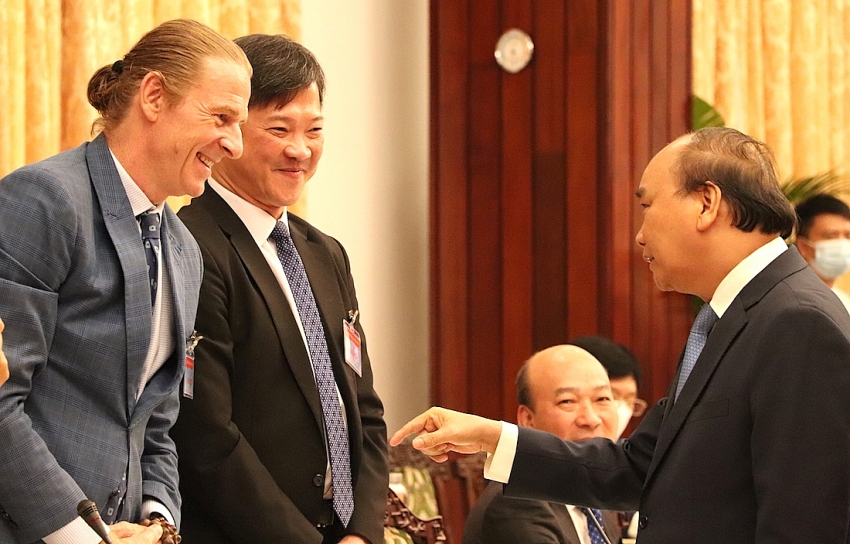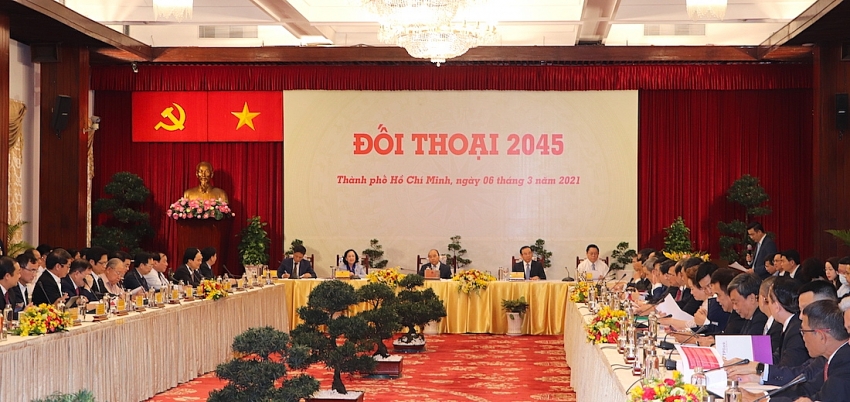Dialogue 2045 – promoting internal motivation to lure international sources
Dialogue 2045 was chaired by Prime Minister Nguyen Xuan Phuc and was attended by more than 30 of the largest foreign and domestic economic groups.
 |
| Dialogue 2045 is part of the programmes to achieve Vietnam's development goals through 2045 |
At the dialogue, Don Lam, CEO of VinaCapital said that towards 2045, to develop the economy, Vietnam needs to review and improve its infrastructure system to receive financial sources from abroad.
“Setting up nests for eagles is one of the most significant issues for all local authorities, and they need to prepare well in all aspects, such as natural resources, land funds, energy, human resources, and incentives for large-scale investors,” he said.
Vietnam also needs to focus on improving infrastructure connectivity among cities and areas, especially between Ho Chi Minh City, Hanoi, and Danang. Better connections are also needed among industrial and processing zones as well as cities and satellite residential areas.
“I do believe that the Vietnamese government will have the best policies to promote its advantages and attract large-scale investors,” Lam said. “There have been many positive changes in investment procedures, significantly shortening application times and accelerating foreign direct investment flows,” he added.
“VinaCapital Group especially is aiming to link investment with foreign investors and 'domestic eagles' into open economic zones and projects located in several provinces and cities, and we expect to attract over $10 billion in the very near future," he cited.
Meanwhile, Dragon Capital chairman Dominic Scriven said that there are three issues which Vietnam should focus on right away in its development strategy, including environmental sustainability, infrastructure system improvement, and promoting financial knowledge to Vietnamese people so that they can make sustainable financial decisions when they get older.
 |
| Dialogue 2045 was attended by many of the largest economic groups |
Meanwhile, Nguyen Dang Quang, chairman and CEO of Masan Group said, “Currently, the global economy is integrated, the most important thing is to create competitiveness for the supply chain. Our volume of exported agricultural products is huge but the infrastructure of the supply chain and distribution is not good enough.”
"Promoting the capacity of supply and distribution infrastructure will help enterprises reduce costs and bring more benefits to consumers, farmers, and exporters themselves,” he said.
Truong Gia Binh, head of the Board for Private Economic Development Studies under the Prime Minister’s Advisory Council for Administrative Procedure Reform (ACAPR) and chairman of FPT Group, stressed the importance of inspiring each individual and entrepreneur to make the country strong and prosperous.
“The private sector must become a strong driver of the whole economy. More than ever, Vietnamese people and every enterprise are sharing a great desire to make the country strong,” Binh said.
He also suggested the government permit private economic groups to handle the current problems of the Vietnamese stock exchange which is claimed to not have enough capacity to accommodate the market.
Nguyen Thi Phuong Thao, chairwoman and CEO of Sovico Group, made similar proposals, saying that private groups can provide VND60 billion ($2.6 million) to revise the stock exchange system.
Replying to enterprises, Prime Minister Nguyen Xuan Phuc highlighted the importance of enterprises as a pillar for the whole economy.
"The larger the pillar, the richer the people and the stronger the country. Today enterprises will swiftly go outdated if they only focus on maximising their profitability. They should instead look to create value for the whole society and contribute to the country's prosperity," the PM emphasised.
To realise this target, he outlined the necessity to further boost national digital transformation and improve the legal framework, which would spur the development of businesses and the country overall.
In addition, Vietnam will provide an opportunity to grow for any business, including foreign-invested companies, collectives, or business households, with the private sector being a major component of the economy.
Under the Resolution of the 13th National Party Congress, Vietnam expects to move out of the low middle-income status by 2025, become an upper-middle income country by 2030, and gain developed and high-income nation status by 2045.
What the stars mean:
★ Poor ★ ★ Promising ★★★ Good ★★★★ Very good ★★★★★ Exceptional
 Tag:
Tag:
Related Contents
Latest News
More News
- Hermes joins Long Thanh cargo terminal development (February 04, 2026 | 15:59)
- SCG enhances production and distribution in Vietnam (February 04, 2026 | 08:00)
- UNIVACCO strengthens Asia expansion with Vietnam facility (February 03, 2026 | 08:00)
- Cai Mep Ha Port project wins approval with $1.95bn investment (February 02, 2026 | 16:17)
- Repositioning Vietnam in Asia’s manufacturing race (February 02, 2026 | 16:00)
- Manufacturing growth remains solid in early 2026 (February 02, 2026 | 15:28)
- Navigating venture capital trends across the continent (February 02, 2026 | 14:00)
- Motivations to achieve high growth (February 02, 2026 | 11:00)
- Capacity and regulations among British areas of expertise in IFCs (February 02, 2026 | 09:09)
- Transition underway in German investment across Vietnam (February 02, 2026 | 08:00)


























 Mobile Version
Mobile Version